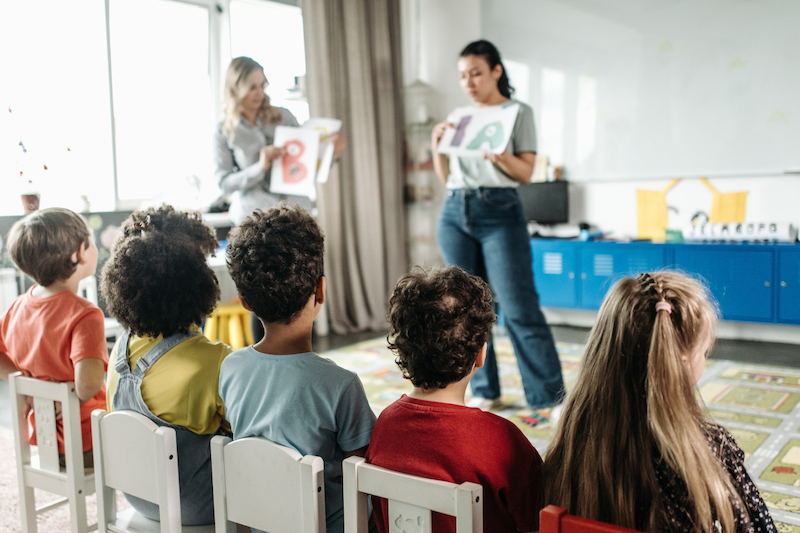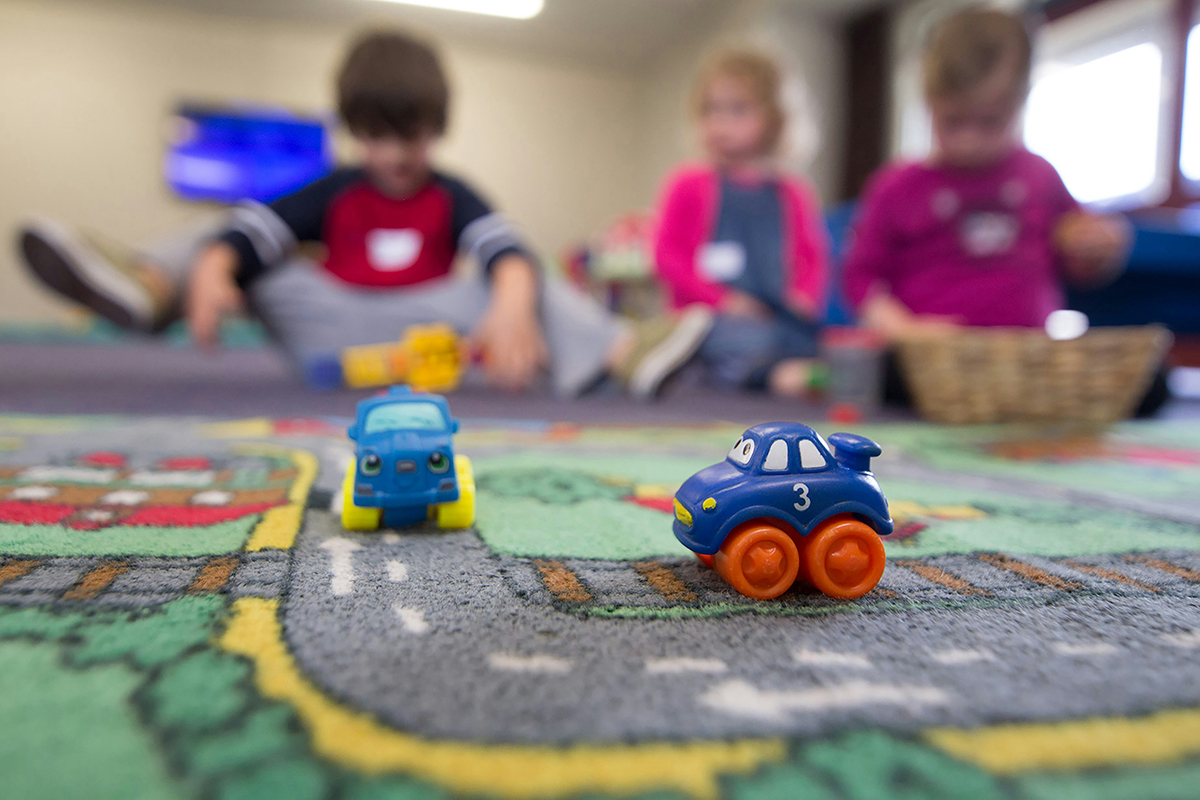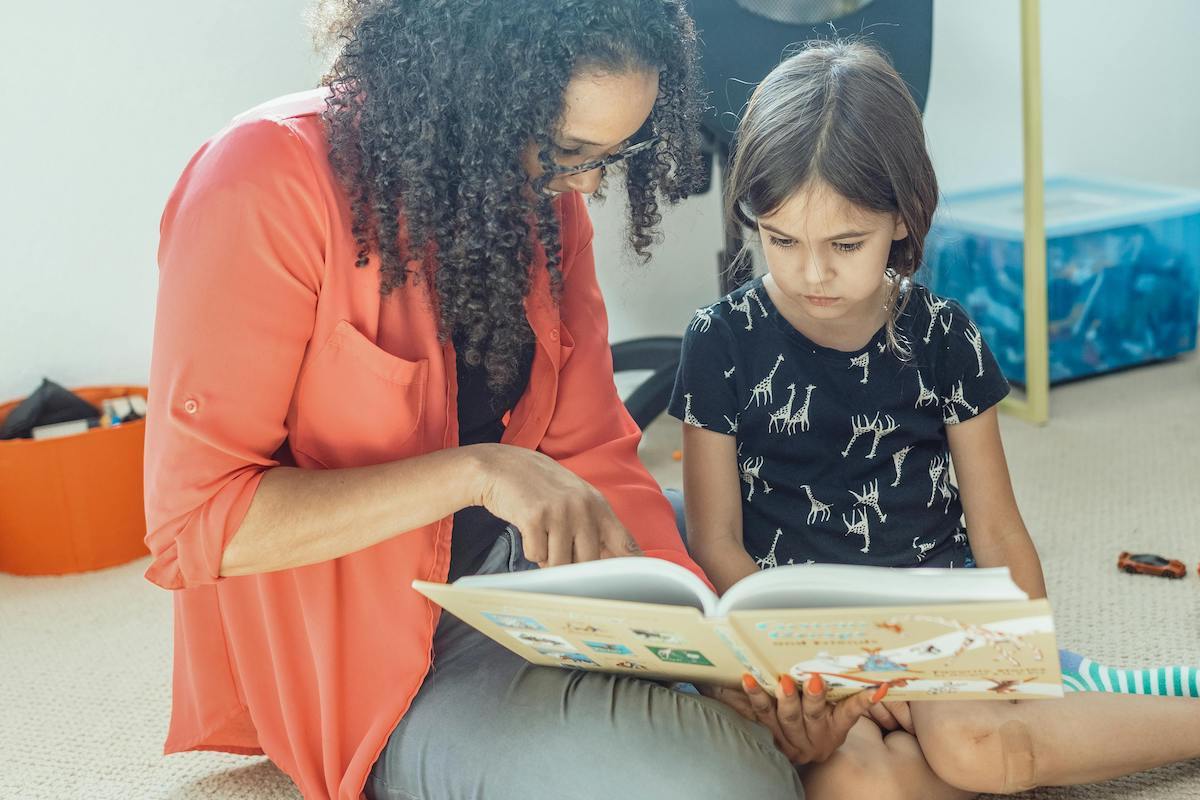A new batch of 5 and 6-year-olds is entering kindergarten, which also means many parents are navigating school for the first time.
When my children were younger, we all loved the Ramona Quimby books. On Ramona’s first day of kindergarten, she goes for a half day. The kids listen to their teacher read a book, they play Duck, Duck, Goose outside, and then everyone takes a nap and leaves. At several points during the day, Ramona wonders when she will be taught to read. Spoiler: it doesn’t happen, at least not that day.
I think about this scene often because of the contrast with the experience many current entering kindergarteners are likely to have. Full day rather than half day, and probably a lot more emphasis on learning to read, and less on Duck, Duck, Goose. Or, at least, that’s the impression that we often get — that kindergarten has gotten less play-based and more academic over time. But has it really? And, if it has, is that really a problem?

Has kindergarten gotten more academic?
On average, over a long-ish time scale, the answer to this seems to be “yes.”
Our best (and really only reliable) systematic data on this comes from the Early Childhood Longitudinal Survey, or ECLS, which is a study that has been run in several waves by the U.S. Department of Education. The first wave of the survey focused on children who were in kindergarten in 1998-1999. A second wave focused on children in kindergarten in 2010-2011. Both waves included about 20,000 children.
Researchers collected all kinds of data about these kids and their home and school environment, cognitive testing, etc. They surveyed teachers and parents in an attempt to provide a broad picture of the early school experiences of this cohort.
A 2016 paper uses these data to answer the question of whether kindergarten has gotten more academic over this period. I think the most illustrative data from their paper is the change in the expectations of teachers about academic skills over this period, as illustrated in the graph below.
In 1998, only 31% of teachers surveyed thought children should learn to read in kindergarten; by 2010, this was 80%. The expectations for academic skills coming into kindergarten increased enormously over this period. The expectations for social and behavioral skills were higher to begin with and increased less.
There are also changes in curricular focus, which suggest even more academics. Although in both time periods virtually 100% of kindergartens covered some reading and language instruction, there were increases in the frequency of tasks like spelling (only 45% did this weekly in 1998, versus 76% in 2010).
When talking to people who have been teaching over this time period, their reports align with these changes towards more academic instruction. It is important to note that the 2011 data is the most recent systematic data we have on these questions. The Department of Education began a new wave of data collection in 2024, which is ongoing, although it is unclear if this will persist given the cuts in that department.
The lack of more recent data leaves us somewhat in the dark as to whether the trends have continued, stagnated, or even somewhat reversed.
What are academics displacing?
If teachers are spending more time on spelling and reading, they must be spending less time on something else. The paper discussed above also provides some context for that. Kindergarten classes were less likely to do music and art daily in 2010 versus 1998. They spend less time on topics like ecology, dinosaurs, or light. Time, which in previous years might have been spent on these exploratory topics, has gone into more core academic fundamentals.
There is also less child-directed play. Between 1998 and 2010, the share of teachers who say that kids spend at least an hour on child-directed play drops from 54% to 40%; offsetting this is a similar-sized increase in the share saying children spend at least three hours in teacher-directed activities. More worksheets and textbooks are being used.
Interestingly, there is an increase in the share of classrooms that report children having recess (from 73 to 82%). Pulling this together, it suggests that what is being displaced is, at least in large part, in-classroom child-directed play. There is a large literature arguing for the importance of play in child development. Although this literature lacks detailed randomized studies, which might speak directly to this classroom structure, a lot of theory suggests that child-directed play is important to learn about the world and building problem-solving skills.
Why has kindergarten become more academic?
It is difficult to point to one thing in the data as the reason for this change. There are likely several intersecting factors.
One is the emphasis on testing in older grades, beginning with the No Child Left Behind Act of 2001. This legislation had the effect of making state-level assessments in grades three through eight much more important in school success. Although this testing doesn’t begin until grade three, the need to get kids “on track” by grade three likely pushed for more academic instruction in younger grades.
A second factor is increasing access to pre-K programs, which often contain some element of academic instruction — at least to the point of teaching children letters or shapes. If kids are coming in with more knowledge and skills of this type, this pushes kindergarten to also move forward.
These factors intersect, and the whole process is self-reinforcing. If teachers expect kids to know their letters when they enter kindergarten, parents may then spend more time teaching them. But this reinforces that this expectation is appropriate, and the cycle goes on.
This is probably all in some vague sense related to the reasons why homework has increased over time, which is, basically, a Cold War-era fear of falling behind the Russians. But at this point, it’s gone beyond that.
Is this a problem?
If we accept that kindergarten has gotten more academic and there are intersecting and complex reasons why, the next obvious question is whether this is actually a problem.
The answer — in my view — is “not necessarily” and, also, “yes.”
Let me explain.
In theory, there isn’t anything wrong with engaging with more academic skills in kindergarten. If every child in a classroom arrives knowing their letters already, it’s silly to imagine a teacher spending the year on that material. They should move to the next thing.
There are two issues we need to grapple with in practice. One is the inequality that is introduced and reinforced by a more academic approach to kindergarten. It is widely understood that there is a “readiness gap” at kindergarten entry across socioeconomic groups. Children who grow up in poverty are less likely to enter kindergarten with the academic skills that teachers are now more likely to expect. These differences can get reinforced over the early school years, meaning these readiness gaps turn into long-term achievement gaps.
With fewer academic expectations entering kindergarten, kids would have more of an opportunity to build these skills during kindergarten. This problem could potentially be addressed by improved access to quality pre-K programs, but those programs are nowhere near universal at this point.
The second issue is that more academic expectations also often come with more time-on-task, sitting-still expectations. This doesn’t have to be true. You could have just as much running around and then change what happens during the sitting time, but in practice, kindergarten has less free time than it once did. Ironically, some evidence suggests that more sedentary behavior in classrooms means less academic achievement, so it is possible this is all counterproductive.
The greater sitting-still expectation also reinforces a different inequality — across genders. Boys may be just as academically capable, but at this age, they are, on average, less able to sit still. This makes a quiet, time-on-task kindergarten a less good fit, and we see boys start to fall behind. These expectations have led some parents to “red-shirt” their boys, holding them back a year to start kindergarten when they are older. This has its own complications, though, and is not accessible to all parents.
This all suggests that for some children, a more academic kindergarten may not serve them well. What makes this whole discussion challenging is that for some kids, it will be the right thing, and they are ready for more academics. For a kid who is ready to learn to read in kindergarten, we should help them do that. But making that the expectation for all children may not be developmentally appropriate.
The bottom line
- Data show that in the years since 1998, teacher expectations for academic skills in kindergarten rose sharply, with far more emphasis on reading and literacy instruction.
- With more time being spent on academics, there is less time spent on exploratory topics such as music and art, as well as a loss of in-classroom child-directed play, which many experts argue is an integral part of child development.
- The shift toward more academic kindergarten is likely driven by multiple factors, including the pressure from standardized testing in older grades and greater access to pre-K programs that introduce early academic skills. These factors reinforce each other, as higher expectations from teachers result in pressure put on parents to prepare children earlier.
- More academic kindergarten isn’t inherently bad, but it can reinforce inequalities: children from lower-income families may start behind, and boys, who often struggle with sitting still, may fall behind even if academically capable. While some kids benefit from advanced academics, making it the expectation for all may not be developmentally appropriate.














Log in
I really strongly believe that Americans are foolish for pushing academics younger. Just like how babies have to be developmentally ready to eat solids, walk, or talk, children have developmental milestones as well, and there is little point in teaching something before their minds are ready to absorb it. It’s very simplistic to think that if we start reading instruction earlier, the kid will learn to read better. Some of them will, but others will get frustrated because they’re being expected to do something they’re simply not capable of doing so early in life. We should be more like the Europeans, who don’t expect reading instruction to start until 6 or 7.
I have this same opinion about starting Algebra too early as well. Pushing it from high school into 8th grade may have been fine, but it seems like not enough kids are ready for the abstract thinking it requires in 7th grade to make full classes and so a lot of kids are pushed into it and end up not getting a solid foundation in it. It was really noticeable in my AP calculus class, because my year started algebra in 8th grade and the kids one year younger than me were allowed to take it in 7th, but by the time we got to AP calculus, it was a mix of juniors and seniors. My teacher would run stats after our quizzes, including the averages of juniors vs seniors, and the seniors consistently scored 4-5% higher on quizzes. These were all smart kids who were good at math! But being older genuinely meant that we collectively understood the material better.
A third issue is that reading is largely developmental. When kids are ready to learn to read, for most of them, it’s pretty easy and feels pretty natural. If you try to make them read before they’re ready, it’s a big struggle and they get frustrated. By first grade almost everybody is developmentally ready, but in kindergarten it’s a mix. Ideally everybody gets reading instruction at the point that they are actually ready to absorb it.
Interesting read (as always). I was wondering whether the research makes any differentiation between Montessori approach and “regular” schools. I could see how maybe the more play / self-directed Montessori approach could be very effective at providing both the academic needs, as well as the ability for young (boys) to develop more at their own pace.
One answer for “c b” about the difference between US vs Northern Europe, has to do with language. Coming from the Netherlands, I can tell you that learning to read in a language like Dutch where the connection between a letter and a sound is a almost one-to-one, is a lot easier than in English. It is always why teaching phonics is so important. But it is the English language that makes it a lot harder for American students to learn to read!
I appreciated this piece, as I am really wondering about whether to keep my 4-year-old in preschool for the kindergarten year, or have her start at the elementary school.
I’m curious about your thoughts on how these trends compare internationally, especially in Northern European countries like Finland, Norway, and Sweden, where formal schooling often doesn’t start until age 6 or 7, and yet they’re still far out-performing the U.S. on academic measures, from what I’ve seen. It makes me think that the U.S. is taking a counterproductive approach, but I’m wondering if I’m missing something.
Honestly I feel that so much LESS is expected of my kids in elementary school than was expected of me (comparing experiences between public school systems in both cases). I’m shocked at how easy elementary school is for my kids. They are truly bored.
I like your differentiation between expectations and how things are taught. As long as kids are able to move at their own pace, and move their bodies a lot, I don’t care that much what they learn in K. But having them sit still and drill the same material at the same exact pace is a recipe for failure.
I would be so upset if our schools went back to half day K. It’s just a demand for even more time taken from stay at home moms. My kids did 8-9 hours per day in child care, starting as babies. Half day K would have been a huge step back for them (and for me). As long as it’s not boring drills all day, all K students should be able to do full days.
We were also deeply relieved not to have naps, finally, starting in K. Naps screwed up our family sleep schedule. Our 5yo’s would still take them at daycare, and then they’d be up later than even we wanted to be as adults. It was such a family victory when they started K and couldn’t nap.
I think the change in expectations is driven from the higher grades on down, with the no child left behind testing culture driving a misguided focus on drills. Keep it fun, be open to a range of child abilities, keep it playful, and keeping expectations high should not then pose a problem. The butts in seats drilling culture is the issue, not the “academic” nature of K per se.
This is a really helpful article, thank you! Emily, do we know why boys “may be just as academically capable, but at this age, they are, on average, less able to sit still”? Is there truly a biological difference, or is it social conditioning and societal norms?
Thank you for this article Emily! We are in constant debate at our home as to whether we should red shirt our son born in July. We struggle with what he should do during the year he is not in Kindergarten as we don’t want him to be bored once he does start and are considering an fully outdoor program for the year so that he gets lots of playtime in.
I would love any thoughts you have, either now or in a follow-up article, on the success of dual-track programs. They are being eliminated in our district and many throughout the country as they are deemed inequitable. But until everyone is entering school with relatively equal skills (which you note is not currently the case) how can a school ensure each child is being appropriately challenged and building on the skills they already have instead of relearning something they know?